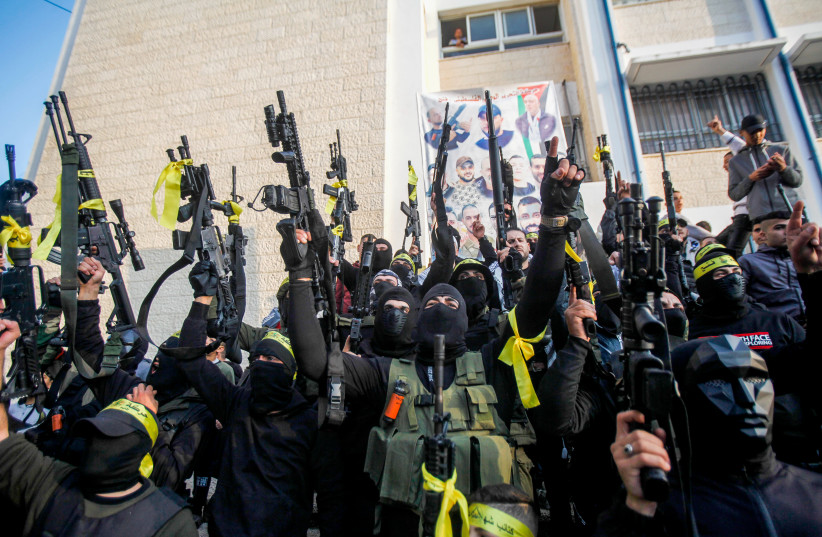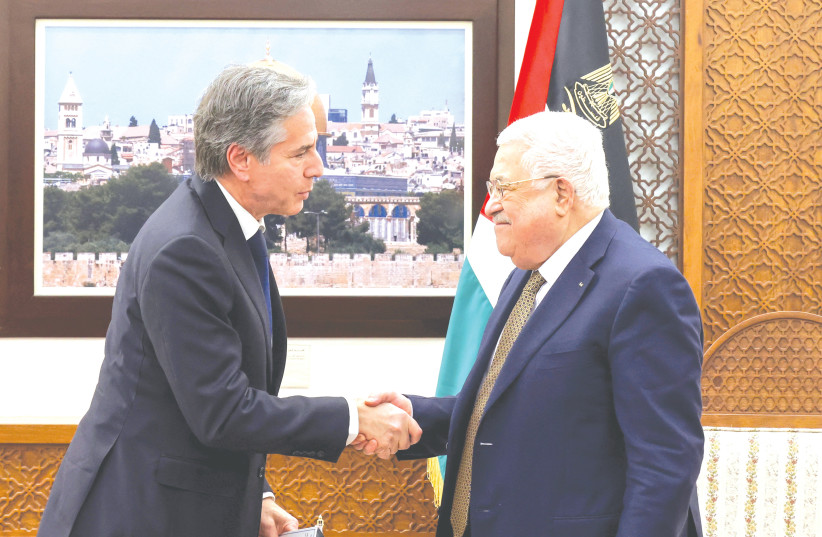Many keep warning about a third intifada (uprising), but as far as some Palestinians are concerned, it’s already here.
Central Intelligence Agency Director William Burns painted a bleak picture of the situation earlier this week, saying he is “quite concerned about the prospects for even greater fragility and even greater violence between Israelis and Palestinians.”
The concern is well founded.
The intifada started a year ago
The third intifada, according to a growing number of Palestinians, started about a year ago in the northern West Bank, when several armed groups sprang up, and they continue to operate against Israeli soldiers and civilians. It’s an angry conglomeration of individuals and both organized and random armed groups with no unified leadership.
The groups are mostly affiliated with Islamic Jihad and the ruling Fatah faction headed by Palestinian Authority President Mahmoud Abbas. Recently, however, the armed wing of Hamas also formed its own terrorist cells in the areas of Jericho, Bethlehem and Hebron to compete for authority with Jihad and Fatah gunmen.

Palestinians who support the armed groups claim that this is “the only language that Israel understands.” In their view, the First Intifada forced Israel to sign a deal with the Palestinians and brought the PLO leadership to the West Bank and Gaza Strip. The Second Intifada, they claim, was the main reason Israel pulled out of the Gaza Strip. Now, they’re hoping that the current intifada will force Israel to make more concessions.
Palestinian officials in Ramallah, however, insist that the US administration, together with the rest of the international community, can still play a major role in preventing a further escalation.
“The ball is now in the American court,” the officials maintain. “The Americans are the only ones who could exert pressure on Israel to stop its unilateral actions and daily killings and invasions.”
Burns made his comments shortly after visiting Jerusalem and Ramallah as part of Washington’s efforts to de-escalate tensions, especially in the West Bank and Jerusalem. Speaking at Georgetown University in Washington, he said that conversations with Prime Minister Benjamin Netanyahu and Abbas “left me with doubts and concerns.”
Burns added, “I was a senior diplomat during the Second Intifada, and now we see some unhappy reminders of what we saw then. Part of the responsibility of the CIA is to work closely with both Israeli and Palestinian security services to prevent a violent uprising. It’s a big challenge.”
Burns was one of three senior US officials who visited Ramallah over the past few weeks. The other two were US Secretary of State Antony Blinken and White House National Security Advisor Jake Sullivan.
“I was a senior diplomat during the Second Intifada, and now we see some unhappy reminders of what we saw then."
CIA Director William Burns
While Abbas’s top advisers voiced appreciation for the Biden administration’s efforts to ease tensions between the Palestinians and Israel, they said they were nevertheless disappointed with Washington’s failure “to turn up the heat on the Israeli government.” They are also disappointed with the Biden administration’s failure to fulfill its promise to reopen the US Consulate in Jerusalem and the PLO diplomatic mission in Washington, which were closed by the Trump administration.
The US officials, according to Palestinian sources, demanded that Abbas reverse his decision to end security coordination with Israel. They further insisted that the Palestinian leader halt his diplomatic warfare against Israel in the international arena.
A few days after the last meeting with Blinken, Abbas briefed senior members of the PLO and Fatah on the discussions he’d held with the US officials.
“The Americans are putting heavy pressure on us to cancel the important decisions we took,” Abbas was quoted as saying, referring to the ending of security coordination with Israel and the Palestinians’ anti-Israel diplomatic campaign at the United Nations and other international forums. “I told them I can’t do anything as long as Israel is continuing to kill Palestinians every day.”
A Palestinian official quoted Abbas as saying that he rebuffed pressure by Biden administration officials to use force to crack down on the gunmen and armed groups. Abbas, the official said, emphasized that if Israel wants to end the phenomenon of armed groups, “all it should do is stop storming our cities and villages.”
The Palestinians claim they did not hear anything new from the visiting US officials, and that’s why there’s no room for optimism. In the eyes of some Palestinians, the Biden administration is either unwilling to exert much pressure on Israel or is incapable of doing so.

ABBAS IS well aware that, even if he wanted to, there’s little he can do to stop the deterioration of control in his domain. He’s not going to dispatch hundreds of security officers to the refugee camps in Jenin and Nablus to arrest gunmen and confiscate their weapons. Such a move would be suicidal for the 87-year-old Abbas, who, according to public opinion polls, is extremely unpopular among his people.
However, Abbas is not only doing nothing to calm the situation but, on the contrary, he’s adding gasoline to the fire by continuing to accuse Israel of committing “massacres and war crimes.”
The tone of the Palestinian media and officials has grown even more toxic. The funerals of most Palestinians killed by the Israeli security forces are broadcast live on Palestine TV. Family members and witnesses are given prime-time television and radio airtime to incite violence against Israel, while some of Abbas’s inner circle have begun employing Hamas-like rhetoric by calling Israel “the Zionist enemy.”
The hope in Ramallah is that the ongoing Israeli security crackdown and other measures, including plans to demolish the Bedouin village of Khan al-Ahmar, will help the Palestinians gain more sympathy in the international community and intensify the pressure on Israel.
The Palestinian leadership wants to end America’s “monopoly” over the conflict with Israel, because the US, in the leadership’s view, will always be biased in favor of Israel. The ultimate goal is to internationalize the conflict by getting other parties, including Russia, China, the European Union and the United Nations, more actively involved in what’s happening between Israel and the Palestinians.
Ironically, some Palestinian officials and political activists are convinced that their mission to vilify and isolate Israel in the international arena will be much easier with the presence of far-right ministers in the government, such as National Security Minister Itamar Ben-Gvir and Finance Minister Bezalel Smotrich.
“The rhetoric and the actions of the two have already earned the Palestinians much sympathy,” said one official. “Look at all the Western diplomats and officials who visited Khan al-Ahmar and al-Aqsa Mosque in the past few days. They realize that Ben-Gvir and Smotrich are dangerous.”
The Palestinian factions realize that the new far-right dominance in the Israeli government has, surprisingly, been a double advantage for them: it has both garnered international sympathy and reinvigorated the people’s support of the “resistance.”
However, the proliferation of roving armed gangs in the West Bank is a clear sign that the PA security forces are no longer the only sheriffs in town. It is an indication of the growing weakness and fragility of the PA and its security services.
PA leaders are currently devoting most of their energies to combating Israel in the international community instead of enforcing law and order in their own by consolidating their control of the Palestinian cities, villages and refugee camps.
Moreover, this is all happening against a backdrop of reports and rumors about a behind-the-scenes battle of succession taking place in Ramallah. Abbas’s advanced age and varied illnesses have the vultures circling; tensions among Abbas’s closest and most trusted cohorts are at their peak, as some of them have their eyes set on his job.
Many of the armed groups and militias in the West Bank are affiliated with, or funded by, a number of these senior Palestinian officials. Others, such as the Nablus-based Lions’ Den, receive funds from Hamas. The situation in its entirety is a powder keg that could ignite a civil war in the post-Abbas era.
For now, the third intifada, or “armed struggle” as some Palestinians refer to it, is solely directed against Israel. But this could change rapidly, in light of the increasing tensions among the top brass of the Palestinian leadership in Ramallah.
